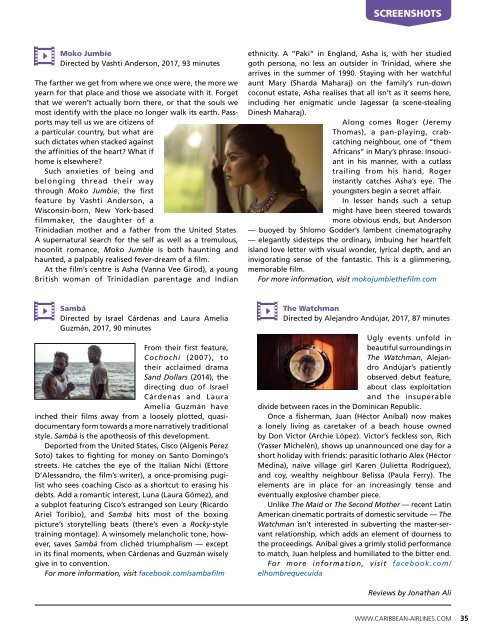Caribbean Beat — September/October 2017 (#147)
A calendar of events; music, film, and book reviews; travel features; people profiles, and much more.
A calendar of events; music, film, and book reviews; travel features; people profiles, and much more.
Create successful ePaper yourself
Turn your PDF publications into a flip-book with our unique Google optimized e-Paper software.
SCREENSHOTS<br />
Moko Jumbie<br />
Directed by Vashti Anderson, <strong>2017</strong>, 93 minutes<br />
The farther we get from where we once were, the more we<br />
yearn for that place and those we associate with it. Forget<br />
that we weren’t actually born there, or that the souls we<br />
most identify with the place no longer walk its earth. Passports<br />
may tell us we are citizens of<br />
a particular country, but what are<br />
such dictates when stacked against<br />
the affinities of the heart? What if<br />
home is elsewhere?<br />
Such anxieties of being and<br />
belonging thread their way<br />
through Moko Jumbie, the first<br />
feature by Vashti Anderson, a<br />
Wisconsin-born, New York-based<br />
filmmaker, the daughter of a<br />
Trinidadian mother and a father from the United States.<br />
A supernatural search for the self as well as a tremulous,<br />
moonlit romance, Moko Jumbie is both haunting and<br />
haunted, a palpably realised fever-dream of a film.<br />
At the film’s centre is Asha (Vanna Vee Girod), a young<br />
British woman of Trinidadian parentage and Indian<br />
ethnicity. A “Paki” in England, Asha is, with her studied<br />
goth persona, no less an outsider in Trinidad, where she<br />
arrives in the summer of 1990. Staying with her watchful<br />
aunt Mary (Sharda Maharaj) on the family’s run-down<br />
coconut estate, Asha realises that all isn’t as it seems here,<br />
including her enigmatic uncle Jagessar (a scene-stealing<br />
Dinesh Maharaj).<br />
Along comes Roger (Jeremy<br />
Thomas), a pan-playing, crabcatching<br />
neighbour, one of “them<br />
Africans” in Mary’s phrase. Insouciant<br />
in his manner, with a cutlass<br />
trailing from his hand, Roger<br />
instantly catches Asha’s eye. The<br />
youngsters begin a secret affair.<br />
In lesser hands such a setup<br />
might have been steered towards<br />
more obvious ends, but Anderson<br />
<strong>—</strong> buoyed by Shlomo Godder’s lambent cinematography<br />
<strong>—</strong> elegantly sidesteps the ordinary, imbuing her heartfelt<br />
island love letter with visual wonder, lyrical depth, and an<br />
invigorating sense of the fantastic. This is a glimmering,<br />
memorable film.<br />
For more information, visit mokojumbiethefilm.com<br />
Sambá<br />
Directed by Israel Cárdenas and Laura Amelia<br />
Guzmán, <strong>2017</strong>, 90 minutes<br />
From their first feature,<br />
Cochochi (2007), to<br />
their acclaimed drama<br />
Sand Dollars (2014), the<br />
directing duo of Israel<br />
Cárdenas and Laura<br />
Amelia Guzmán have<br />
inched their films away from a loosely plotted, quasidocumentary<br />
form towards a more narratively traditional<br />
style. Sambá is the apotheosis of this development.<br />
Deported from the United States, Cisco (Algenis Perez<br />
Soto) takes to fighting for money on Santo Domingo’s<br />
streets. He catches the eye of the Italian Nichi (Ettore<br />
D’Alessandro, the film’s writer), a once-promising pugilist<br />
who sees coaching Cisco as a shortcut to erasing his<br />
debts. Add a romantic interest, Luna (Laura Gómez), and<br />
a subplot featuring Cisco’s estranged son Leury (Ricardo<br />
Ariel Toribio), and Sambá hits most of the boxing<br />
picture’s storytelling beats (there’s even a Rocky-style<br />
training montage). A winsomely melancholic tone, however,<br />
saves Sambá from clichéd triumphalism <strong>—</strong> except<br />
in its final moments, when Cárdenas and Guzmán wisely<br />
give in to convention.<br />
For more information, visit facebook.com/sambafilm<br />
The Watchman<br />
Directed by Alejandro Andújar, <strong>2017</strong>, 87 minutes<br />
Ugly events unfold in<br />
beautiful surroundings in<br />
The Watchman, Alejandro<br />
Andújar’s patiently<br />
observed debut feature,<br />
about class exploitation<br />
and the insuperable<br />
divide between races in the Dominican Republic.<br />
Once a fisherman, Juan (Héctor Aníbal) now makes<br />
a lonely living as caretaker of a beach house owned<br />
by Don Victor (Archie López). Victor’s feckless son, Rich<br />
(Yasser Michelén), shows up unannounced one day for a<br />
short holiday with friends: parasitic lothario Alex (Héctor<br />
Medina), naïve village girl Karen (Julietta Rodríguez),<br />
and coy, wealthy neighbour Belissa (Paula Ferry). The<br />
elements are in place for an increasingly tense and<br />
eventually explosive chamber piece.<br />
Unlike The Maid or The Second Mother <strong>—</strong> recent Latin<br />
American cinematic portraits of domestic servitude <strong>—</strong> The<br />
Watchman isn’t interested in subverting the master-servant<br />
relationship, which adds an element of dourness to<br />
the proceedings. Aníbal gives a grimly stolid performance<br />
to match, Juan helpless and humiliated to the bitter end.<br />
For more information, visit facebook.com/<br />
elhombrequecuida<br />
Reviews by Jonathan Ali<br />
WWW.CARIBBEAN-AIRLINES.COM 35


















